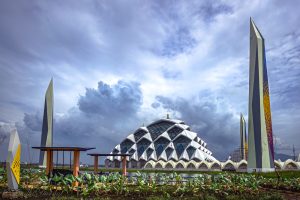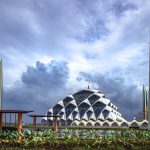SURABAYA, Indonesia (Morning Star News) – A group of Muslims disrupted the Maundy Thursday Mass of a church in Indonesia last week, the latest in a series of protests at the site, sources reported.
In the village of Sukamiskin, Arcamanik Subdistrict, Bandung, capital of West Java Province, radical Muslims of the Arcamanik Diversity in Unity Citizens Communication Forum demonstrated in front of the Arcamanik Multipurpose Building (Gedung Serba Guna, or GSG) where the St. Odilia Parish church met for worship on Thursday (April 17).
The protestors disrupted the Holy Thursday worship with loudspeakers, banners, and blaring music at the site at the former St. Odelia Catholic Higher Education for Religious Teachers compound, according to news portal bandungbergerak.id. Congregation members still arriving were forced to find a route around the blockade.
The protesters demanded that the Arcamanik Multipurpose Building not be used for a place of worship.
“This building is a multipurpose building – don’t change and convert it to another use, especially a place of worship,” said Budi Haryono, protest coordinator, according to bandungbergerak.id. “Please sort out the permits and the legal aspects. But what is clear is that until now, [this building] is still a multi-purpose building.”
Denying that they were disrupting the Maundy Thursday Mass, the protestors claimed they were merely questioning the function of the building as a place of worship that allegedly does not comply with its permit.
“They [GSG management] said they were working on changing the function of the building to the authorities, but that is impossible,” said a protesting resident told bandungbergerak.id.
Besides delaying the service, the protestors broadcast national songs that drowned out the Mass, according to bandungbergerak.id.
Several demonstrators shortly before 5 p.m. tried to break through a line of security officers, pushing a few meters closer to the GSG, but police stopped their progress.
Arcamanik Multipurpose Building lies on the now-defunct St. Odelia Catholic Higher Education for Religious Teachers compound in the village. It belongs to the St. John the Apostle station, part of St. Odelia Parish under the Diocese of Bandung.
“The rejection of the Mass in Arcamanik by a group of people reflects an intolerant attitude that is contrary to the principles of diversity and freedom of religion,” said Ardi Manto Adiputra, director of Impartial, an Indonesian human rights watchdog, in a statement reported by Tempo.co. on Saturday (April 19).
In the 1945 Constitution of the Republic of Indonesia, Article 28E paragraph (1) and Article 29 paragraph (2) holds that Mass as one of the rituals guaranteed in the right to worship, Ardi reportedly said.
“Mass is a sacred ritual for Catholics. Rejection of it is not only a form of intolerance but also a violation of the basic principles of the rule of law,” he reportedly said.
Muslims had first staged at demonstration at the site on March 2, according to wartakotalive.com. On March 30, at the end of the Muslim fasting month that culminated in Eid al-Fitr, a larger number of Muslims held a protest while Catholics were holding Ash Wednesday.
Shouting jihadist slogangs about the greatness of Allah, the demonstrators demanded the dismissal of the Ash Wednesday Mass, ayobandung.com reported. In front of police officers, the demonstrators shouted that Ramadan was also a month of jihad, and that therefore they would not move from the site until the church attendees were dismissed, according to the outlet.
Video footage posted on March 7 by Karya Vince showed a speaker declaring, “Ramadhan is the month of jihad. We are not afraid; we will never leave this place until they are dismissed,” with the crowd responding with chants of the jihadist slogan, “Allahu Akbar [God is greater].”
Demonstrators said Catholics were allowed to hold activities at the public facility, including worship once a month, but maintained it should not be used for regular weekly worship.
“Residents can use Arcamanik Multipurpose Building facilities, including worship activities that initially started once a month, it was still tolerated,” protestor Anton Minardi told bandungbergerak.id. “Over time, why did it become a permanent activity? Residents can no longer use it.”
Dyah Nur Susanti, one of the leaders of the St. Odilia Parish, told bandungbergerak.id that the disputed lot was originally purchased by a parish priest, the Rev. Yosef Gandi, who later transferred it to the Diocese of Bandung, which had designated it as a parish asset for worship since 1988.
“The building has never functioned as a public facility or social facility,” Dyah said, noting that when the building was built in the 1980s, the government and residents had not granted permission for it to be used for church worship.
In response to these objections, the Bandung Diocese designated it as a multipurpose building in the hopes that it could also be used for worship, a common practice at multipurpose buildings in Indonesia.
The church permitted area residents to use it as well, but instead of considering it a goodwill gesture, they viewed it only as a public facility primarily for use by the surrounding community.
Yoseph Kebe, a member of the church construction committee, said the congregation now numbers around 1,400 people and is in dire need of a place of worship.
“We need a place of worship. Several residents refuse, but we have tried to hold meetings and dialogues; there are still dissatisfied parties,” Yosep told reporters on March 5.
He emphasized that the church repeatedly explained its ownership over the building but that area residents locals kept rejecting it.
“We have explained our position many times, including the status of the land and the building, but they refused,” Yoseph said. “If there are allegations, it should be proven through legal channels.”
The central board of the Indonesian Catholic Scholars Association (ICSA) requested that the disputing parties hold a dialogue to resolve the issue, tribunnews.com reported.
“This happens during the fasting month, both Muslims and Christians. Dialogue should be held immediately to understand the actual legal status of the multipurpose building because what proves it is the original documents from the owner,” said ICSA Chairman Luky Yusgiantoro.
The share of Indonesia’s population that is Muslim is 83.3 percent, with 11.43 percent of citizens identifying as Christian and 3.23 percent as evangelicals, according to the Joshua Project.
Indonesian society has adopted a more conservative Islamic character, and churches involved in evangelistic outreach are at risk of being targeted by Islamic extremist groups, according to Christian support organization Open Doors.
If you would like to help persecuted Christians, visit https://morningstarnews.org/resources/aid-agencies/ for a list of organizations that can orient you on how to get involved.
If you or your organization would like to help enable Morning Star News to continue raising awareness of persecuted Christians worldwide with original-content reporting, please consider collaborating at https://morningstarnews.org/donate/?
###
© 2025 Morning Star News. Articles/photos may be reprinted with credit to Morning Star News. https://morningstarnews.org
Tweet: https://twitter.com/morningstarnewz/
Facebook: https://www.facebook.com/MorningStarNews
Morning Star News is a 501(c)(3) non-profit corporation that relies solely on contributions to offer original news reports of persecuted Christians. By providing reliable news on the suffering church, Morning Star News’ mission is to empower those in the free world to help and to encourage persecuted Christians that they are not forgotten or alone. For free subscription, contact [email protected]; to make tax-deductible donations, visit https://morningstarnews.org/donate/? or send check to Morning Star News, 34281 Doheny Park Rd., # 7022, Capistrano Beach, CA 92624, USA.
- Mosque in Bandung built by the West Java provincial government. (Cep Budhi Darma, Creative Commons)





